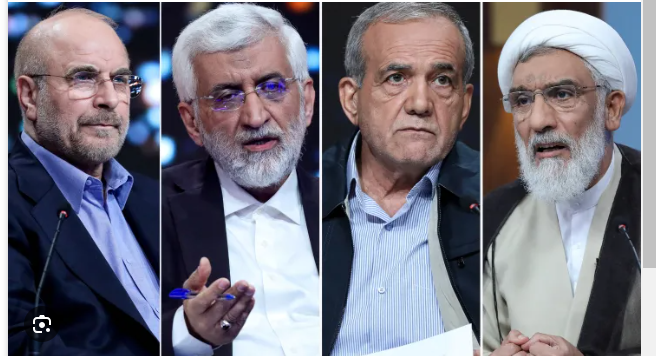Iran’s Supreme Leader Ayatollah Ali Khamenei kicked off the country’s presidential election on Friday as Iranians decide whether to continue the country’s hardline conservative course or take a more moderate stance.
Casting his vote in the capital, Tehran, Mr Khamenei urged the nation to participate in the poll to “prove the correctness and honesty of the system of the Islamic Republic.”
Some 61 million voters in Iran are eligible to elect a successor to hardliner Ebrahim Raisi, who died in a helicopter crash in May.
The election comes amid a severe economic crisis, tensions with the West and frustrations among the public with the enforcement of state power and the government, especially among the younger population.
The candidates seen as having the best chances to win the election are the hardliner Saeed Jalili, a former negotiator in nuclear talks with Western powers; parliamentary speaker Mohammad Bagher Ghalibaf; and former health minister and reformist candidate Masoud Pezeshkian.
During the campaign, Mr Pezeshkian criticised the government’s strict policy on women wearing headscarves but also expressed his loyalty to Mr Khamenei and praised the attack launched on Israel with drones and missiles in April.
Leading voices from the reformist camp have pledged their support for him, and if he reaches a second round, he may stand a good chance of winning.
The cleric Mostafa Pourmohammadi is also still in the running.
Despite the title of president, Mr Raisi was only number two in Iran’s power structure, as Mr Khamenei functions as the head of state and has the final say in all strategic matters. He is also commander-in-chief of Iran’s armed forces.
The Guardian Council, an extremely conservative supervisory body, had only authorised six candidates for the election.
Earlier in the week, two conservative hardliner candidates withdrew their nominations to unite support among hardline voters heading to the polls.
Many Iranians, especially young people, have lost faith in major political change at home.
The death of the young Kurdish woman Mahsa Amini in autumn 2022 sparked nationwide protests against the Islamic system of rule, but the protests were quashed long ago with harsh punishments for demonstrators.
If none of the candidates secure an absolute majority, a runoff vote will occur on July 5.
The first results from the first round are expected on Saturday.
(dpa/NAN)










More Stories
FG says Nigerians will benefit from sale of 753 housing unit seized from Emefiele
El-Rufai laments: ‘Justice available only to the rich, powerful’
Man claims infidelity as reason for setting wife, three children ablaze